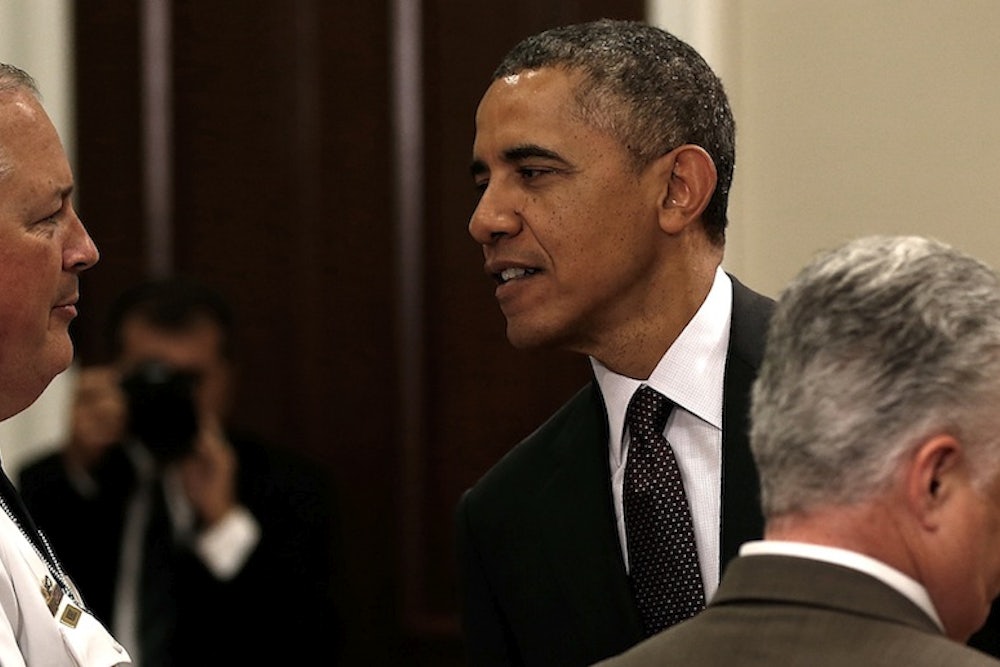President Barack Obama has asked Congress for $3.7 billion in supplemental funding to handle the influx of 52,000 unaccompanied children who have crossed the southwestern border this year.
That’s more money than many expected Obama to request. And a big chunk of it would be used to house, feed, and take care of the children and families coming into the U.S. But another big chunk would go towards enforcement—policing the border and processing immigration cases more quickly, as a possible prelude to deportation. A smaller allotment would go to international aid.
So what’s the reaction been? About what you’d expect.
Republicans are already saying that it’s too much money and not enough focus on enforcement. One, House Judiciary Chairman Bob Goodlatte, called Obama’s proposal a “slap in the face.” Appearing on CNN, he said, “There’s no plan, no accountability of how the money’s going to be spent. … It comes to tens of thousands of dollars for every one of those children.” Other Republican leaders, including House Budget Chairman Paul Ryan and Senate Appropriations’ Chairman Richard Shelby, are already talking about the need for offsetting spending. But they didn’t come out against the plan outright—a sign, perhaps, that some version of the initiative might actually be able to pass.
Immigration advocates, several of whom I interviewed, had a very different take. They like the call for more human services and legal funding, but worry it’s not enough, particularly given the special needs of children. And they think the efforts to ratchet up enforcement make little sense in the absence of a much larger effort to address what they say is the root cause of the crisis: The fact that so many Central American children and women are looking to escape violence and poverty in their home countries. “It’s unfortunate that this supplemental appropriations request seems to primarily be looking at this situation from an enforcement and deterrence lens,” said Ben Johnson, executive director of the American Immigration Council. “You’re not going to be able to solve this problem by being tough on immigrants and trying to send some message back home by processing these cases quickly.”
Here’s a quick breakdown of the dollars in Obama’s request:
Supporting and caring for refugees: $1.8 billion. This money would go directly to the Department of Human and Health Services, which cares for the children while they are in U.S. custody. It would support more facilities as well as medical screenings.
Enforcement and deterrence: $1.5 billion. This would be the second biggest allotment. It would go to Immigration and Customs Enforcement and Border Patrol. They would use the money to pay for the associated transportation costs, more border surveillance, more officers, and to deport undocumented adults who may be with the children.
Processing immigration cases: $64 million. The bulk of this new funding, for immigration courts, would include funding to hire more 40 more judges to handle a caseload of about 50,000. The need here is big. While border enforcement funding has grown by 300 percent since 2002, the immigration judicial system has seen a much smaller increase. Even in a normal year, where there’s no migration crisis, the courts face a backlog of hundreds of thousands of cases. The extra judges would speed adjudication—and, likely, the pace of deportation. $15 million is to provide children with representation to guide them through the legal process.
International aid and repatriation: $300 million. The State Department would get this money. It would be used in part for repatriation centers in Central America, and also to help those governments control their own borders.
Some experts and advocates singled out that last part, the $300 million for international aid, for praise—even as they acknowledged it might not be enough. “It clearly signals here that there is an understanding that there are bigger solutions here that must be brought into play,” said Doris Meissner, Director of the Migration Policy Institute’s Immigration Policy Program.
But others were less sanguine. Ben Johnson, executive director of the American Immigration Council, wished Obama sought funding for USAID—and other programs aimed at the humanitarian and systemic problems of violence and corruption in the migrants’ home countries. The $300 million for the State Department wouldn’t do that, he said—it doesn’t “involve significant investment in the regional response.”
Megan McKenna, communications and advocacy directorat Kids in Need of Defense (KIND), raised another concern. “We appreciate the support for more adjudication for children but we’re concerned it’s heavy on enforcement and less is going to the root causes of this migration of children,” McKenna told me. While the request includes a separate $15 million for representation of children, she said, it’s not nearly enough. “To [speed up deportations] and not to provide attorneys is not the way to address the issues.”
